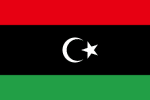Libya Doesn’t Own Trademarks To Embassy Name, Judge Rules
 Los Angeles — The nation of Libya and its embassy lost their bid to bar an individual from his alleged infringement of the country’s claimed trademarks for the embassy’s own name when a District of Columbia federal judge ruled last week that Libya does not have valid, protectable trademarks.
Los Angeles — The nation of Libya and its embassy lost their bid to bar an individual from his alleged infringement of the country’s claimed trademarks for the embassy’s own name when a District of Columbia federal judge ruled last week that Libya does not have valid, protectable trademarks.
Ahmad Miski allegedly infringed what Libya claimed to be trademarks for the country’s name in his work as an “expediter” of documents for the Libyan embassy’s “document legalization” process, according to Judge Reggie B. Walton’s Sept. 6 opinion. Under that process, all commercial and legal documents must be “legalized” to verify their authenticity and validity to those receiving the documents.
Miski, through his Arab-American Chamber of Commerce, facilitates the legalization of documents at the certification stage, before the embassy formally legalizes them. He registered several domain names using the name of the Libyan embassy to increase the internet search rankings for his own Arab-American Chamber of Commerce website, according to the opinion.
It is undisputed that the names at issue in the case, “Embassy of Libya” and “Libyan Embassy,” are not registered trademark, the judge said.
Libya and its embassy maintained that they have rights in the embassy trademarks based on their actual use in commerce in conjunction with specific services in the United States, namely the document legalization process, but Judge Walton disagreed.
“Because the plaintiffs have failed to show that they have valid marks entitled to protection, they cannot prevail on their claims under either the Lanham Act or the AntiCybersquatting Conusumer Protection Act,” Judge Walton said.
The judge also shot down Miski’s counterclaims against Libya for tortious interference.
“Because the defendant has failed to meet his evidentiary burdens with regard to his counterclaim, he cannot prevail on either his claim of tortious interference with contract or his claim of tortious interference with prospective economic advantage,” he said.
The case was filed in 2006, well before the Arab Spring uprising that toppled the rule of Col. Muammar Qaddafi. Judge Walton put the case on hold in April 2011, when that uprising was in full force and the country’s political situation was unstable, but resumed proceedings in October.













